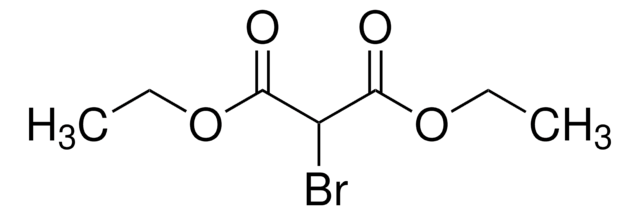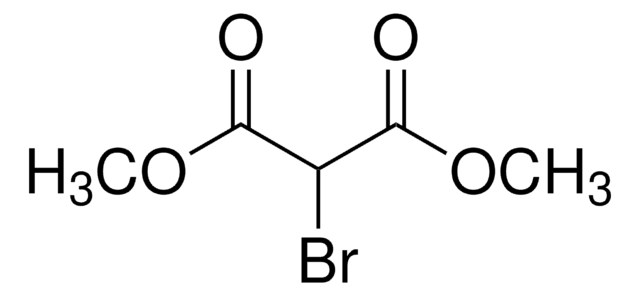All Photos(1)
About This Item
Linear Formula:
BrC(CH3)(CO2C2H5)2
CAS Number:
Molecular Weight:
253.09
EC Number:
MDL number:
UNSPSC Code:
12352100
PubChem Substance ID:
NACRES:
NA.22
Recommended Products
Assay
98%
form
liquid
refractive index
n20/D 1.449 (lit.)
density
1.325 g/mL at 25 °C (lit.)
functional group
bromo
ester
SMILES string
CCOC(=O)C(C)(Br)C(=O)OCC
InChI
1S/C8H13BrO4/c1-4-12-6(10)8(3,9)7(11)13-5-2/h4-5H2,1-3H3
InChI key
CSLQAXTUGPUBCW-UHFFFAOYSA-N
General description
Diethyl 2-bromo-2-methylmalonate acts as initiator during the atom transfer radical polymerization of methyl methacrylate.
Application
Diethyl 2-bromo-2-methylmalonate was used to investigate the 1,2,2,6,6-pentamethylpiperidine as an effective reducing agent for the radical chain conversion of primary bromoesters to the corresponding esters. It was used in the synthesis of polystyrene macroinitiator via atom transfer radical polymerization.
Signal Word
Danger
Hazard Statements
Precautionary Statements
Hazard Classifications
Eye Dam. 1 - Skin Corr. 1B
Storage Class Code
8A - Combustible corrosive hazardous materials
WGK
WGK 3
Flash Point(F)
235.4 °F - closed cup
Flash Point(C)
113 °C - closed cup
Personal Protective Equipment
dust mask type N95 (US), Eyeshields, Gloves
Choose from one of the most recent versions:
Already Own This Product?
Find documentation for the products that you have recently purchased in the Document Library.
Customers Also Viewed
Organic reducing agents. Reduction of electron deficient bromides by 1, 2, 2, 6, 6-pentamethylpiperidine (PMP)/mercaptoethanol.
Amoli M, et al.
Tetrahedron Letters, 36(23), 3997-4000 (1995)
TAILOR MADE POLYMERIC SYSTEMATIC LIBRARIES VIA ATOM TRANSFER RADICAL POLYMERIZATION.
Jakubowski W, et al.
Polymer Preprints (American Chemical Society, Division of Polymer Chemistry), 49(2), 369-369 (2008)
Controlled/?living? atom transfer radical polymerization of methyl methacrylate using various initiation systems.
Matyjaszewski K, et al.
Macromolecules, 31(5), 1527-1534 (1998)
Our team of scientists has experience in all areas of research including Life Science, Material Science, Chemical Synthesis, Chromatography, Analytical and many others.
Contact Technical Service





![(Ir[dF(CF3)ppy]2(dtbpy))PF6](/deepweb/assets/sigmaaldrich/product/structures/982/913/02dd8ddd-6deb-40a0-ab9b-07b18f1abb09/640/02dd8ddd-6deb-40a0-ab9b-07b18f1abb09.png)


![[Ir(dtbbpy)(ppy)2]PF6](/deepweb/assets/sigmaaldrich/product/structures/158/329/2544d673-d267-4aa1-8f46-2652aad4bfa0/640/2544d673-d267-4aa1-8f46-2652aad4bfa0.png)






